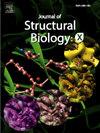钾离子通道KcsA失活
IF 3.5
Q2 BIOCHEMISTRY & MOLECULAR BIOLOGY
引用次数: 13
摘要
失活,即激活后缓慢停止传递,是钾离子通道的一个普遍特征。它对它们的功能至关重要,失活中的故障会导致许多病理。与n型失活不同,c型失活的详细机制仍然是一个活跃的研究领域。晶体学、计算模拟和核磁共振极大地丰富了我们对这一过程的理解。在此,我们回顾了关于c型失活的主要假设,特别关注核磁共振研究对原核钾通道KcsA所起的关键作用,KcsA是哺乳动物电压门控通道的良好模型。本文章由计算机程序翻译,如有差异,请以英文原文为准。

Inactivation in the potassium channel KcsA
Inactivation, the slow cessation of transmission after activation, is a general feature of potassium channels. It is essential for their function, and malfunctions in inactivation leads to numerous pathologies. The detailed mechanism for the C-type inactivation, distinct from the N-type inactivation, remains an active area of investigation. Crystallography, computational simulations, and NMR have greatly enriched our understanding of the process. Here we review the major hypotheses regarding C-type inactivation, particularly focusing on the key role played by NMR studies of the prokaryotic potassium channel KcsA, which serves as a good model for voltage gated mammalian channels.
求助全文
通过发布文献求助,成功后即可免费获取论文全文。
去求助
来源期刊

Journal of Structural Biology: X
Biochemistry, Genetics and Molecular Biology-Structural Biology
CiteScore
6.50
自引率
0.00%
发文量
20
审稿时长
62 days
 求助内容:
求助内容: 应助结果提醒方式:
应助结果提醒方式:


